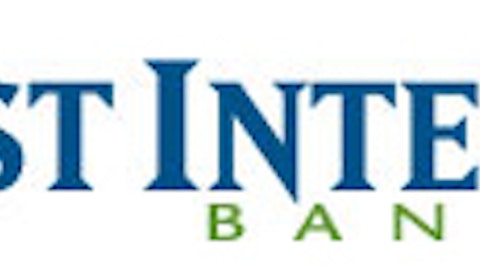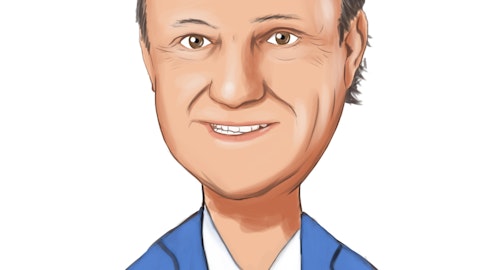David Becker: There, at least from my perspective, franchise value should be booked value. And that’s almost on $40 will be $40 by the end of the year. And when we’re below that, I think it’s good use of capital. We don’t want to put ourselves in a bad position, obviously with TCE and capital risk out here. But again, the quality of our portfolio who knows six months from now we might be in a full blown recession and the walls are coming down. But from everything we see, and we know of what we’re doing today, we’re comfortable to we’re below 40 bucks to keep buying back shares as we think it’s a great use of capital.
Operator: The next question is from the line of Nathan Race with Piper Sandler.
Nathan Race: Apologize I paused a little late. As you’re going through, can your comments around the margin? Look for the first half of the shooting? We get the grades twice. We know and then, I was worried
David Becker: Hey, Nat, you’re cutting out.
Nathan Race: Yes. Again I apologize. I was just wondering. Can you hear me better?
Ken Lovik: Not really.
David Becker: Yes, we get about every third word.
Operator: The next question is from a line of John Rodis with Janney.
John Rodis: Ken you said I think you said in your discussion, your comments about loan growth, you said loan growth for 23 would be less than 22. What loans were up? I think, by my math 20%, 21% and 22? I mean, can you narrow down the growth a little bit more? I mean, are we talking 10% to 12%? Are we talking 15%? Or what are we sort of talking about?
Ken Lovik: No, overall, John, we’re probably talking in the range of 5% to 7%. And maybe I’ll just elaborate on that a bit. I mean, we have we’re, as we talked about focusing, kind of re mixing the composition of the loan book. I mean, we still have within construction and SBA and franchised and consumer we still have some great opportunities to put on, higher rate and variable rate and in both cases, both the variable rates that are higher rates. But a lot of that financing is going to be done through amortization and cash flows from other parts of the portfolio. There’s just some of our lending areas right now the market is so the competition still has rates very, very low that just don’t work for us. So we’re going to see I mean, there’s probably in combination within say residential mortgage and some other areas that there’s going to be roughly $250 million of lower balances year over year.
So, again, a lot of that focus on the higher yielding asset class is just going to be a reshuffling of the loan book, if you will.
David Becker: One of the other issues out there, John is on the consumer lending side, we had tremendous growth in the RV horse trailers last year, a lot of that was pent up demand because of the pandemic and the demand for those units. The Elkhart, Indiana and Northern Indiana is kind of the heartland for the RV industry. Their pipelines are getting caught up, they’re getting back to normal sales activity, I think fourth quarter ’22 versus fourth quarter ’21 sales are down 26%, there about close to 30%. So that’s going to drop down tremendously to over the course of the next year, we were up 200 million plus over ’21 and that’ll follow-up. So as Ken said, between repayment of existing, again, the healthcare portfolios and a total wind down and repayment status that we could, we’re still going to do a lot of volume of new loans, but the overall balance sheet growth is not going to be that huge.



